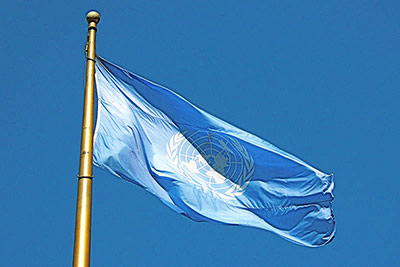12 UN agencies in historic call for end to LGBTI abuses
 In an unprecedented joint initiative, 12 UN agencies have issued a powerful joint call to end violence and discrimination against LGBTI people.
In an unprecedented joint initiative, 12 UN agencies have issued a powerful joint call to end violence and discrimination against LGBTI people.
The statement highlights the link between human rights abuses against LGBTI people and ill health, family break-up, social and economic exclusion and lost opportunities for development and economic growth.
“This is the first time that so many members of the UN family have joined forces in defence of the basic rights of lesbian, gay, bisexual, transgender and intersex people,” said UN Human Rights Office Chief of Global Issues, Charles Radcliffe.
“It’s both an expression of commitment on the part of UN agencies, and a powerful call to action for governments around the world to do more to tackle homophobic and transphobic violence and discrimination and abuses against intersex people.”
The statement sets out specific steps that governments, in particular, should take to curb violence and protect individuals from discrimination.
These include measures to improve the investigation and reporting of hate crimes, torture and ill-treatment, prohibit discrimination, and review and repeal all laws used to arrest, punish or discriminate against people on the basis of their sexual orientation, gender identity or gender expression.
“Violence and discrimination against people based on sexual orientation, gender identity and biological sex characteristics violate their human rights and impoverish whole communities. That is why United Nations agencies working across such a wide range of areas – from human rights to health, education, employment, development, children’s rights, gender equality, food security and refugees – have come together to push for change,” Radcliffe said.
“While the symbolism of this is important, the practical recommendations we are putting forward are more important. We hope this statement can provide a blueprint to governments, as well as to UN teams on the ground in countries around the world,” he added.
According to a May 2015 report by the International Lesbian, Gay, Bisexual, Trans and Intersex Association (ILGA) homosexuality remains illegal in 76 countries.
Eight of these allow for homosexuality to be punished with the death penalty, although only five national (Mauritania, Sudan, Iran, Saudi Arabia and Yemen) actually implement it. Some provinces in Nigeria and Somalia as well as Isis-held areas also impose the death penalty.
The joint UN statement on “Ending Violence and Discrimination against Lesbian, Gay, Bisexual, Transgender and Intersex People” was endorsed by:
The International Labour Organization (ILO); the Office of the United Nations High Commissioner for Human Rights (OHCHR); the Joint United Nations Programme on HIV/AIDS (UNAIDS) Secretariat; the United Nations Development Programme (UNDP); the United Nations Educational, Scientific and Cultural Organization (UNESCO); the United Nations Population Fund (UNFPA); the United Nations High Commissioner for Refugees (UNHCR); the United Nations Fund for Children (UNICEF); the United Nations Office on Drugs and Crime (UNODC); UN Women; the World Food Programme (WFP); and the World Health Organization (WHO).
Leave a Reply